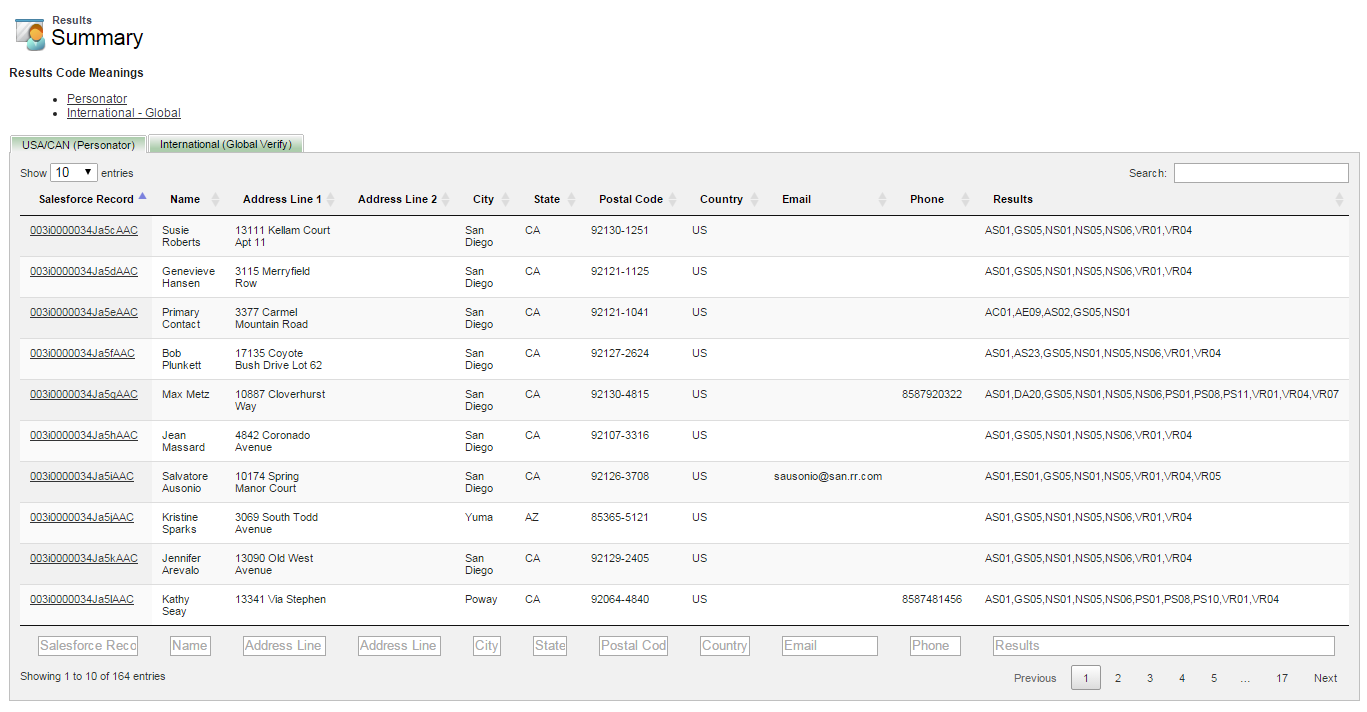This wiki is no longer being updated as of December 10, 2025.
|
Legacy:Salesforce:Batch Processing: Difference between revisions
Jump to navigation
Jump to search
Created page with "{{LegacyListwareForSalesforceNav}} {{CustomTOC}} Clean Suite provides US and global address batch processing. A couple of things to note before starting a batch job: *Decid..." |
No edit summary |
||
| (One intermediate revision by the same user not shown) | |||
| Line 1: | Line 1: | ||
{{LegacyListwareForSalesforceNav}} | {{LegacyListwareForSalesforceNav | ||
|VisualforceCollapse= | |||
}} | |||
{{CustomTOC}} | {{CustomTOC}} | ||
| Line 13: | Line 15: | ||
The easiest way to start a batch job is to go to the tab “Clean Suite Batch Process”. You will then see a screen like this: | The easiest way to start a batch job is to go to the tab “Clean Suite Batch Process”. You will then see a screen like this: | ||
[[File:LWS_Batch_StartingAJob.png|frame|none|Starting a Batch Job]] | [[File:LWS_Batch_StartingAJob.png|frame|none|alt=LWS Batch - Starting A Job - Melissa Wiki|Starting a Batch Job]] | ||
| Line 27: | Line 29: | ||
After a batch job has finished, you can go to the Clean Suite Results/Summary tab. In there, you’ll be able to search records by the result codes from which you can then pinpoint records that validated and those that did not. | After a batch job has finished, you can go to the Clean Suite Results/Summary tab. In there, you’ll be able to search records by the result codes from which you can then pinpoint records that validated and those that did not. | ||
[[File:LWS_Batch_JobSummary.png|frame|none|Viewing a Summary of the Batch Jobs]] | [[File:LWS_Batch_JobSummary.png|frame|none|alt=LWS Batch - Job Summary - Melissa Wiki|Viewing a Summary of the Batch Jobs]] | ||
[[Category:Legacy:Clean Suite for CRM:Salesforce]] | [[Category:Legacy:Clean Suite for CRM:Salesforce]] | ||
Latest revision as of 01:13, 13 January 2022
← Legacy:Clean Suite for CRM:Salesforce
| Legacy Salesforce Navigation | |||||
|---|---|---|---|---|---|
| |||||
| |||||
| |||||
|
Clean Suite provides US and global address batch processing. A couple of things to note before starting a batch job:
- Decide which Salesforce object you want to batch process. Once you’ve decided, make sure that the appropriate mappings have been set under the Clean Suite Advanced Mappings tab.
- If you worried about your data, please be sure to make a backup.
- If you have triggers setup on the object that you want to process, they may interfere with the batch processing.
Starting a Batch Job
The easiest way to start a batch job is to go to the tab “Clean Suite Batch Process”. You will then see a screen like this:

- Select an object type that you have already created a mapping for.
- There are a few batch options that you can set:
- Pick a service you would like to run the records through. If your records are located in the US or CAN, pick Personator. Otherwise, pick Global.
- Record Update – If turned on, Clean Suite will then overwrite and standardize the original record provided it can validate the data. Otherwise, the results will be stored elsewhere and only viewable if you add in our Visualforce pages
- Batch settings – Either process records that haven’t been processed/validated yet or process everything
- Once you have selected your options click on the button Start job. If all the options are set correctly, a new job will appear below in the Batch Jobs box. You will then be able to monitor the progress of the jobs and cancel if necessary.
Viewing a Summary of the Batch Jobs
After a batch job has finished, you can go to the Clean Suite Results/Summary tab. In there, you’ll be able to search records by the result codes from which you can then pinpoint records that validated and those that did not.
